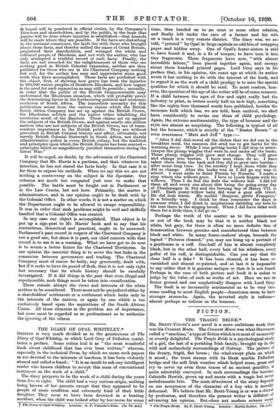F IC ON.
THE TRAGIC. BRIDE.*
Ma. Banxr-Youxers new novel is a more ambitious work than was his Crescent Moon, The Crescent 310018.3988 what Stevenson called a "machine," a type of fiction which is to most of us secretly or overtly delightful. The Tragic Bride is a psychological study of a girl, the last of a perishing Irish family, brought up in the wild and melancholy surroundings of Galway. The picture of the dreary, frigid, flat house ; the wind-swept plain on which it stood ; the trout stream with its bleak marble Palladian bridge and the soft Irish weather which helped moss, grass and ivy to cover up even those traces of an ancient gentility, quite admirably conveyed. In such surroundings the heroine, Gabrielle Hewish, grows up and meets with a tragic but never melodramatic fate. The main denoihnent of the story derod3 on our acceptance of the character of a boy who is merallY deformed. We believe that Mr. Brett-Young is or was a doctor by profession, and therefore the present writer is diffident of advancing his opinion. But .does not modern science se'ut • The Tragic Bride. By F. Brett-Young. London Startln scam Ps. art' the idea of a child, in whose environment there is no particular disadvantage, developing a mind and a body without develop- ing a normal soul ? Arthur Payne, we must believe, if we are to believe Gabrielle's story, is a creature like the muleteer in °Ueda. He is healthy, handsome, intelligent, but he cheats at games, lies in the meanest way, and, worst, is guilty of the most fiendish cruelty to weak and defenceless creatures—squirrels, rabbits and birds.
Though, alas ! it is not possible to maintain that all men are born equal, still is it not the tendency of modem research to emphasize the notion that every child who is born has, to a certain extent, a fresh start ? But though the character Arthur Payne is hard to swallow, the rest of the book has a very pleasing consistency of atmosphere—an atmosphere which produces a sense of even melancholy in the reader. Most women would agree that the scene between Gabrielle and Arthur Payne's mother, and generally their tragic but almost friendly struggle for the possession of the boy, are admirable psychology. Yet when all is said in praise of this novel—and there certainly is a great deal to praise—the reader will probably feel that he wishes Mr. Brett-Young had given the world a new book of poems instead. Many novelists could have given us The Tragic Bride, but very few poets have given us anything like The mar and the poem on Porton water.







































 Previous page
Previous page